#Turkey rafting
Explore tagged Tumblr posts
Text
1 note
·
View note
Text
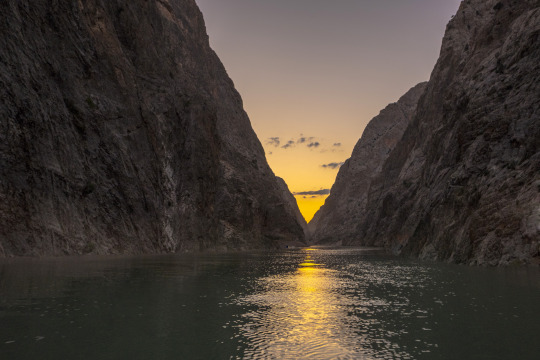
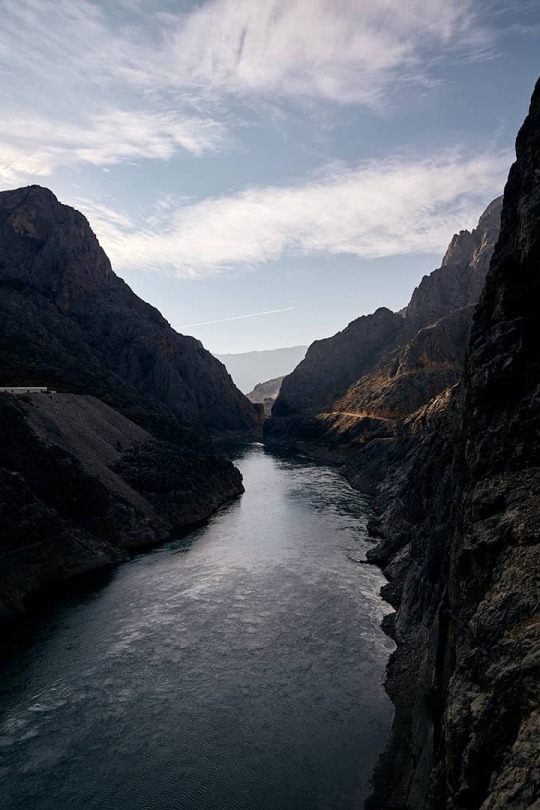
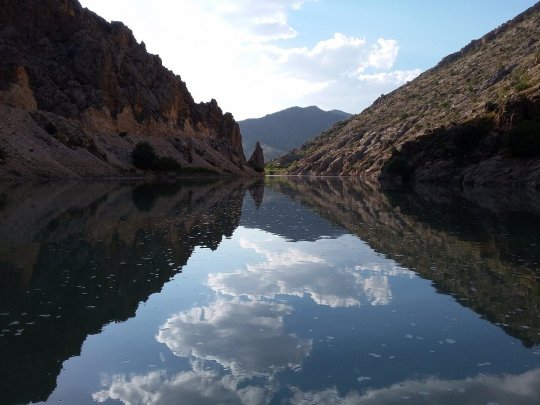
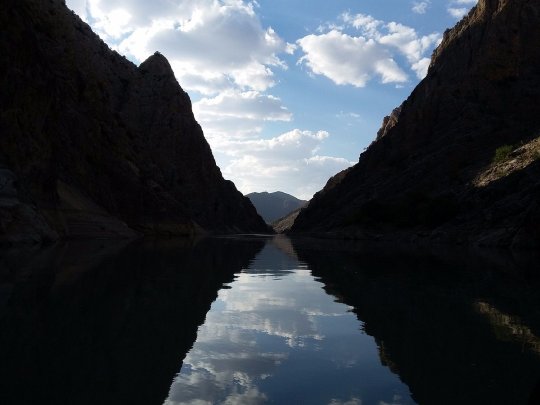
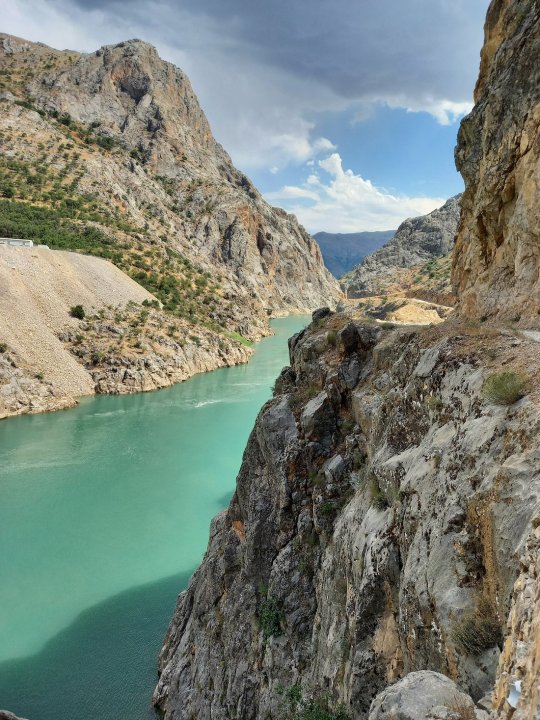
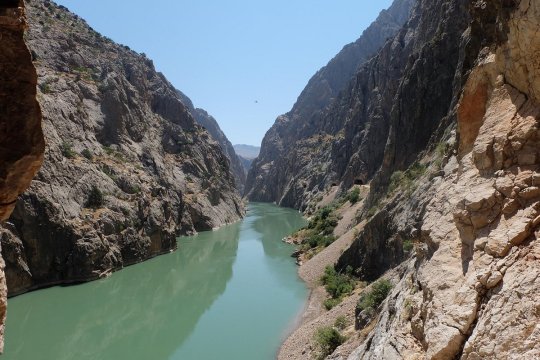
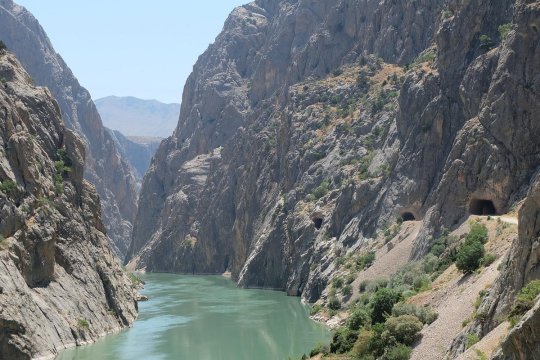
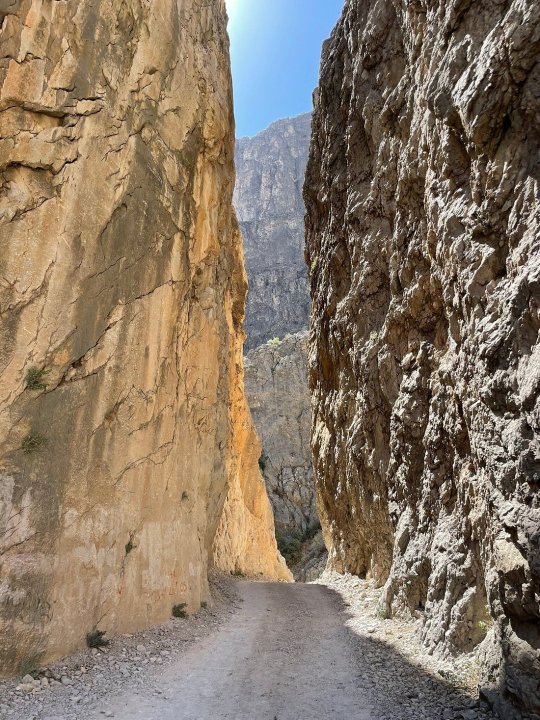
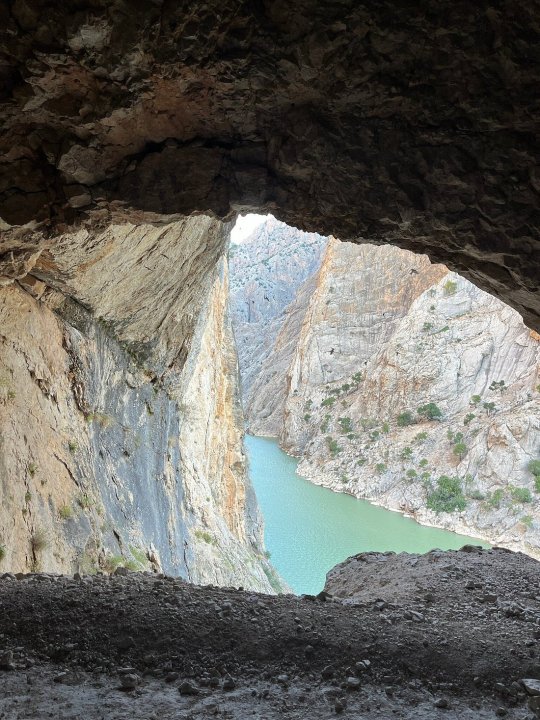
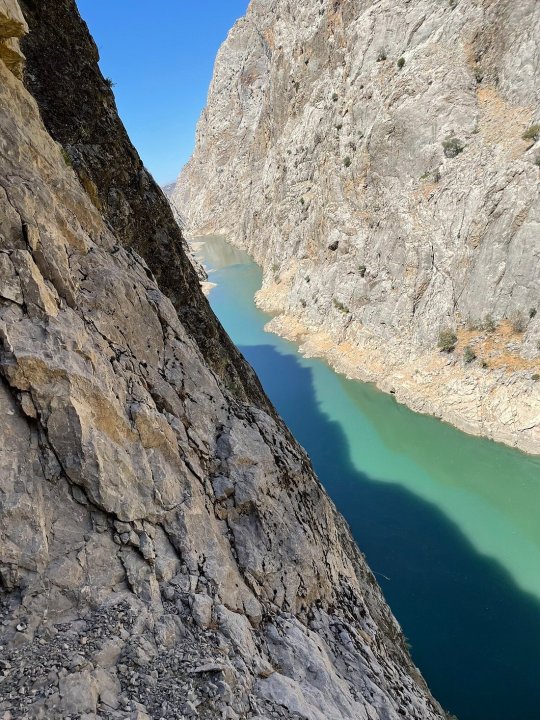
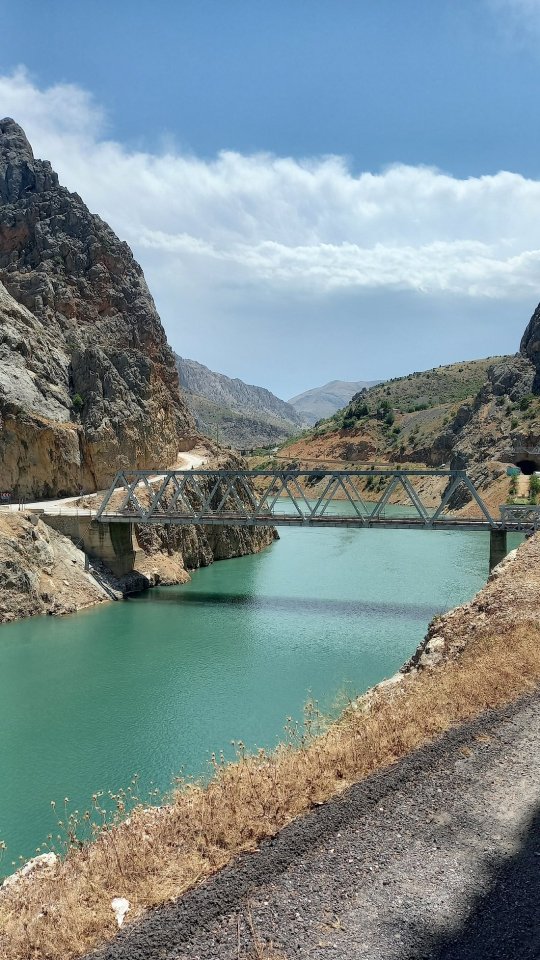
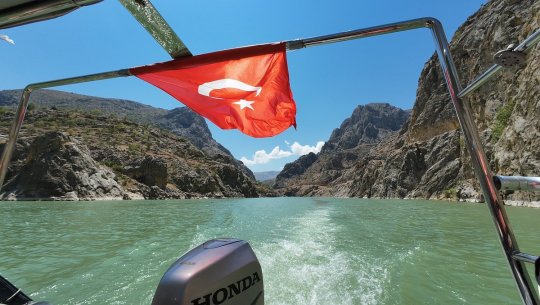
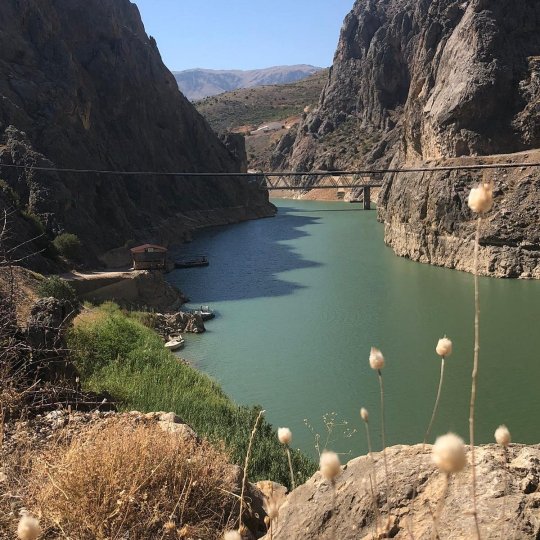
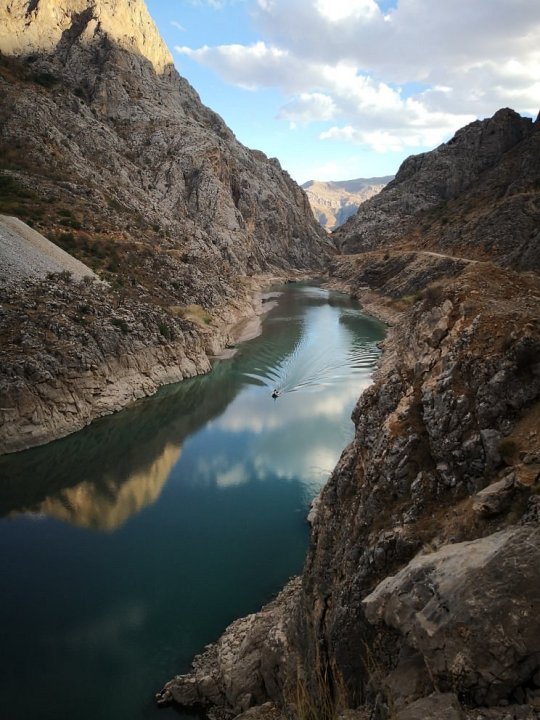
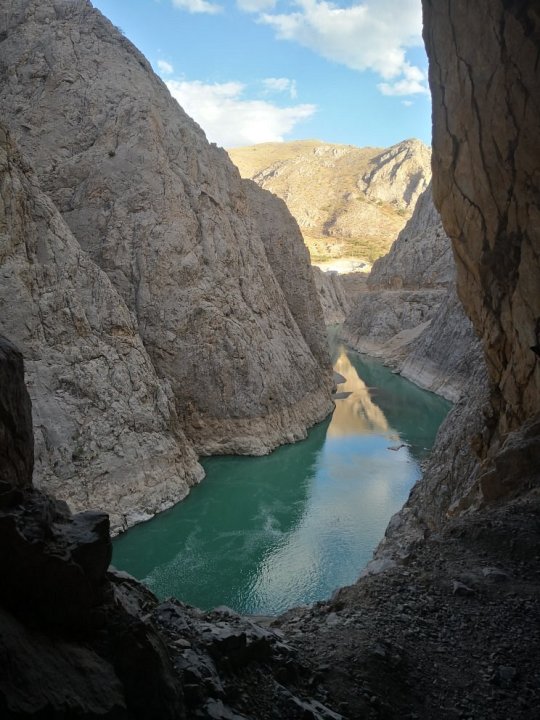
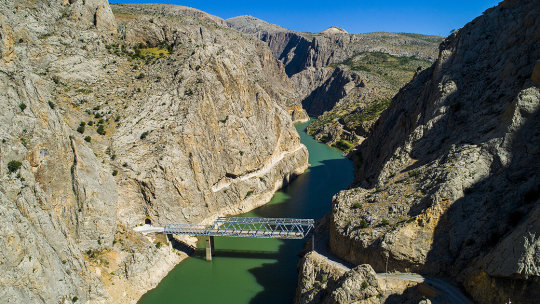
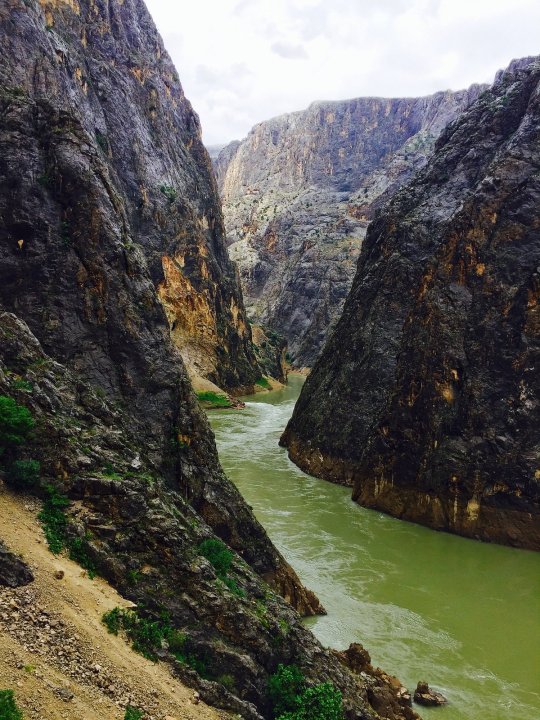
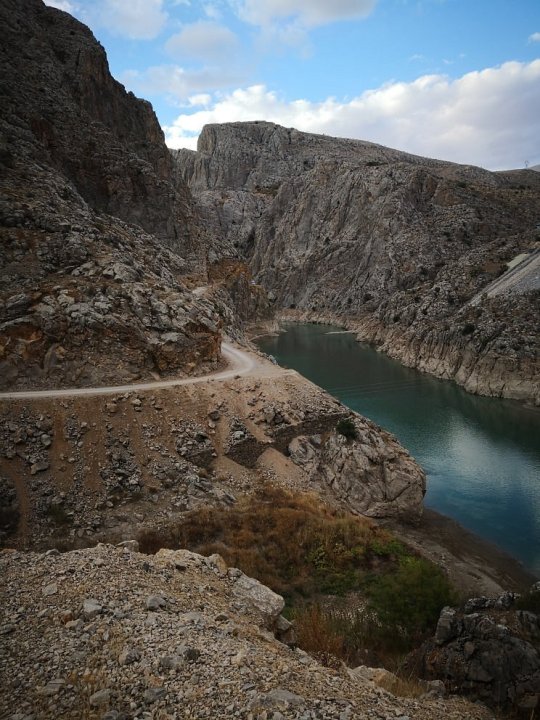
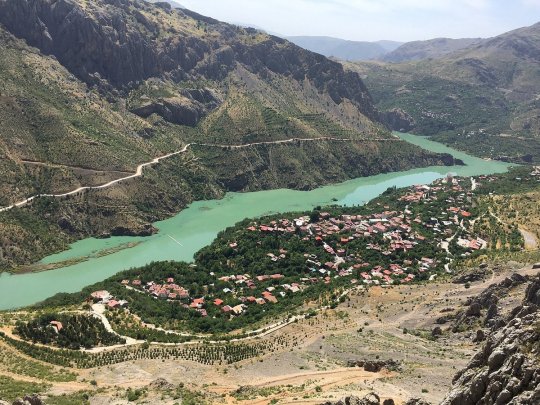
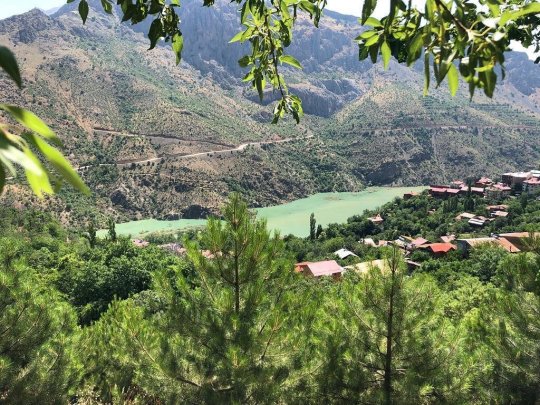
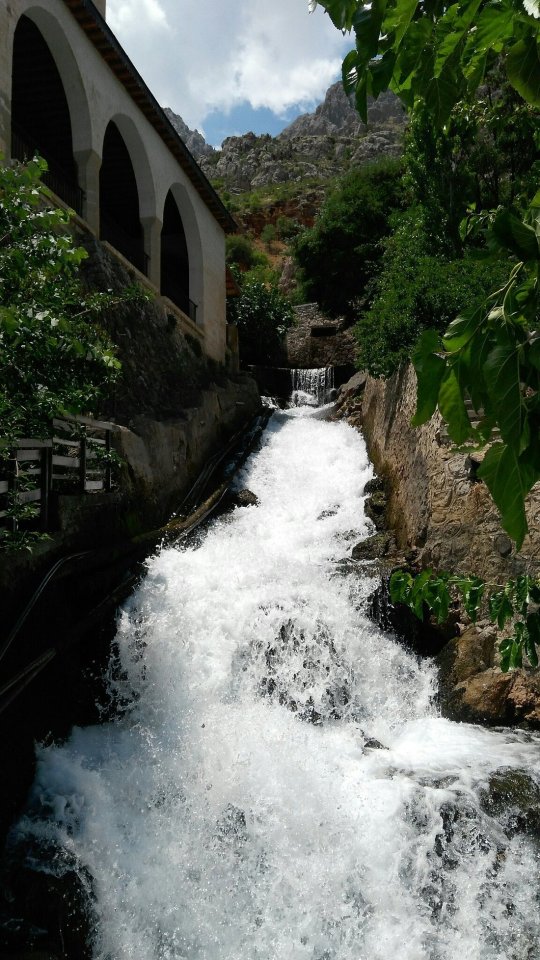
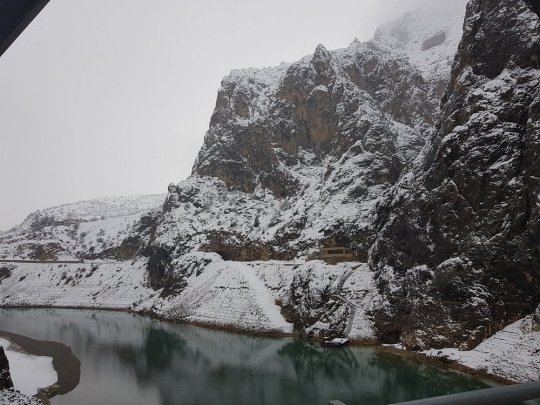
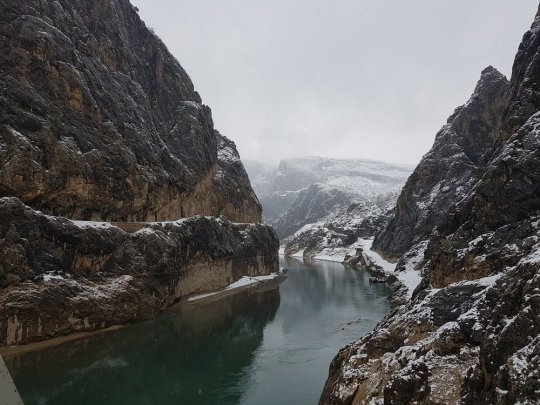
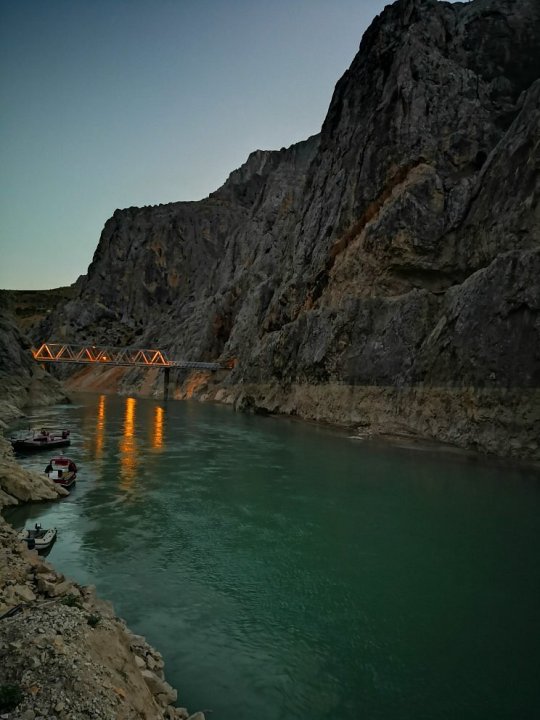
Каньон Каранлык или буквально «Темный каньон».
Каньон Каранлык -один из крупнейших каньонов в мире и представляет собой глубокое ущелье с крутыми склонами. Каньон расположен между районами Илич и Кемалие в провинции Эрзинджан, Турция, образован рекой Карасу.
Длина каньона 35 км, ширина у основания 10-15 м, крутизна склона почти 90%. Каньон Каранлык с глубиной 1000 метров входит в пятерку самых глубоких каньонов в мире.
Каменная дорога длиной 7 километров, открывающая любителям приключений изысканные виды вдоль Темного каньона, сейчас используется в туристических целях, а не в транспортных целях. На туристическом маршруте 38 больших и малых туннелей и множество крутых поворотов и обрывов.
Благодаря географическому расположению и природным красотам ежегодно каньон посещают тысячи местных и иностранных любителей адреналина.В каньоне можно заняться активными видами отдыхом на открытом воздухе, включая альпинизм и катание на катере, гребля на каноэ и рафтинг.
Karanlık Canyon or literally "Dark Canyon".
Karanlık Canyon is one of the largest canyons in the world and is a deep gorge with steep sides. The canyon is located between the districts of Ilic and Kemaliye in the province of Erzincan, Turkey, and is formed by the Karasu River.
The canyon is 35 km long, 10-15 m wide at the base, and the steepness of the slope is almost 90%. With a depth of 1000 meters, Karanlık Canyon is one of the five deepest canyons in the world.
The 7-kilometer-long stone road, which offers adventurers exquisite views along the Dark Canyon, is now used for tourism purposes, not for transportation. There are 38 large and small tunnels and many sharp turns and cliffs on the tourist route.
Due to its geographical location and natural beauty, the canyon is visited by thousands of local and foreign adrenaline junkies every year. The canyon offers a variety of outdoor activities, including mountain climbing, boating, canoeing and rafting.
Источник://t.me/roundtravel,//gocanyons.goturkiye.com/ru/canyons-eastern-anatolia,//ru.wikibrief.org/wiki/Karanlık_Canyon, /www. tripadvisor.ru/Attraction_Review-g781289-d7760471-Reviews-Kemaliye_KaranlIk_Kanyon-Erzincan_Erzincan_Province.html, /gocanyons.goturkiye.com/ru/canyons-eastern-anatolia, //www. aa. com.tr/ru/турция/каньон-мрака-привлекает-в-турцию-любителей-экстремальных-прыжков-/1627648, //www.russianturkiye. com / news/eshhe-dva-tureczkih-kulturnyh-obekta-voshli-v-spisok-yunesko/,/www.aa.com.tr/tr/yasam/adrenalin-tutkunlarinin-vazgecilmez-adresi-karanlik-kanyon/1626876.
#Turkey#Erzincan#canyons#Karanlık#Dark Canyon#nature#mountains#river#stone road#tunnel#bridge#bushes#dry herbs#landscape photography#nature video#nature aesthetic#Турция#Эрзинджан#каньоны#Каранлык#природа#пейзаж#горы#кустарники#сухие травы#река#каменная дорога#туннель#мост
151 notes
·
View notes
Text
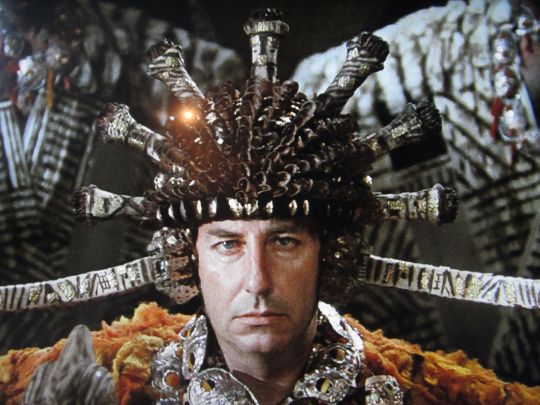

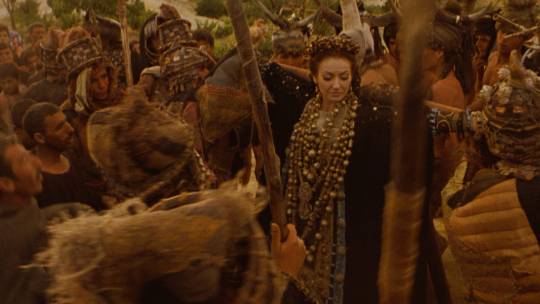

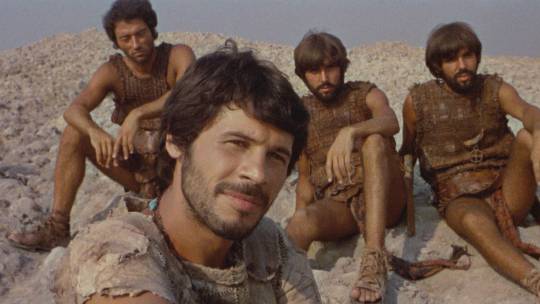
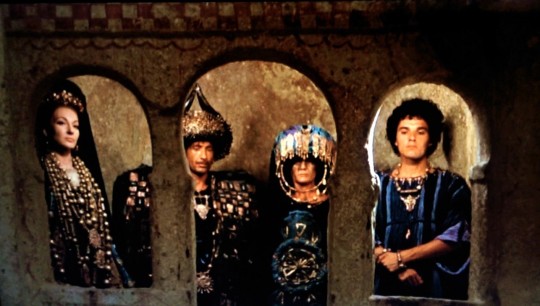
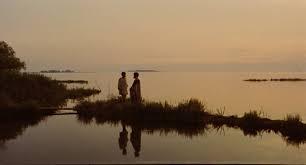
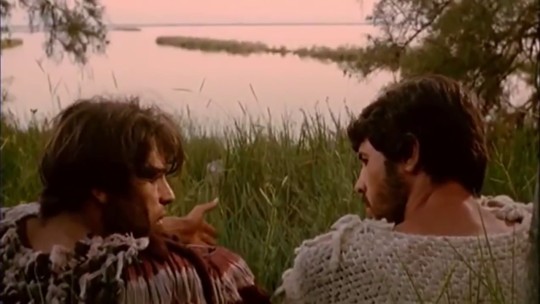

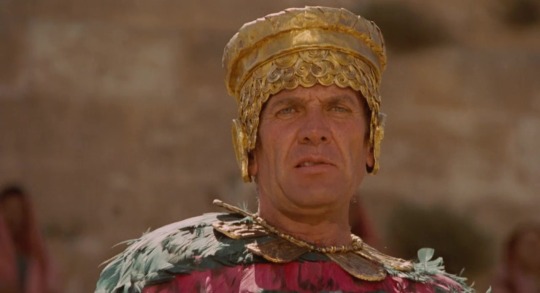

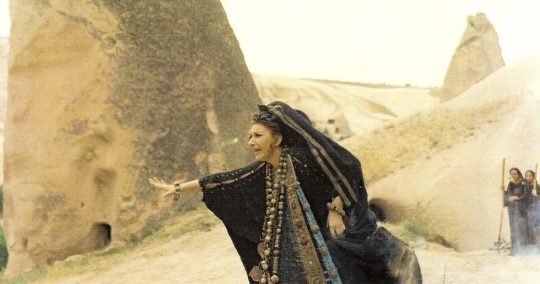
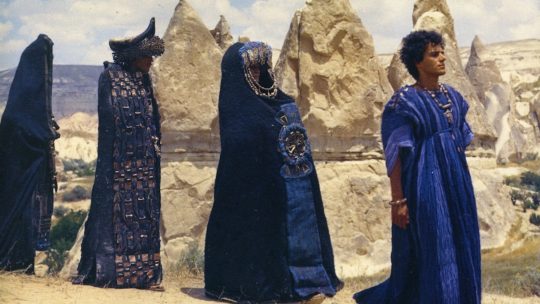
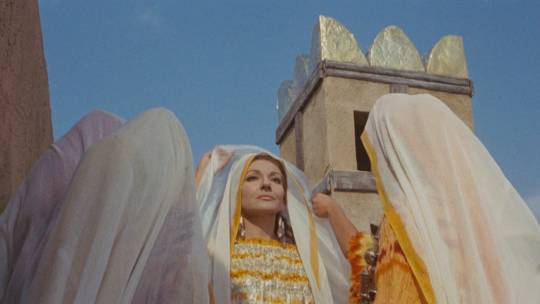
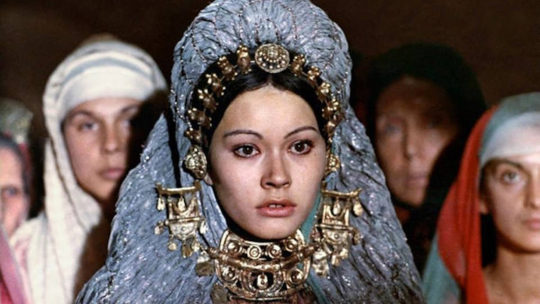
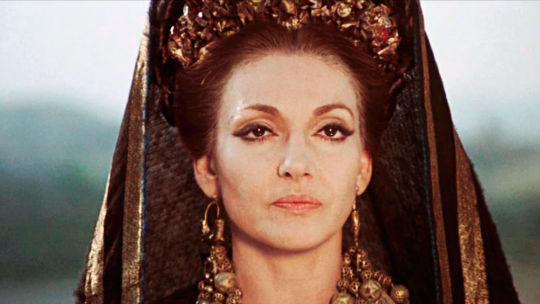
Medea (Pier Paolo Pasolini, 1969)
Cast: Maria Callas, Massimo Girotti, Lauren Terzieff, Giuseppe Gentile, Margareth Clémenti, Paul Jabara. Screenplay: Pier Paolo Pasolini, based on a play by Euripedes. Cinematography: Ennio Guarnieri. Production design: Dante Ferretti. Costume design: Piero Tosi. Film editing: Nino Baragli.
Pier Paolo Pasolini's retelling of the story of Medea is a challenge to anyone who doesn't already know the story: Pasolini is not interested in conventional movie storytelling, so the film feels shapeless, lurching through some scenes and lingering through others until it ends almost abruptly. What he's interested in is crafting a vision of antiquity, of the age from which the myths and legends came, that's primitive and tribal, not at all the graceful world of marble gods and goddesses we've come to associate with ancient Greece. This is a world in which people scrabble for survival in bleak desert settings, filmed in Turkey and Syria. In Pasolini's film, the Argo, the ship that brings Jason and the Argonauts to Colchis in search of the Golden Fleece, is a cobbled-together raft. The fleece itself is a somewhat ratty-looking ram's head with gilded horns. It's not exactly a film in which you'd expect to find a diva like Maria Callas, and yet her out-of-placeness somehow fits the character of Medea, a woman who would rise above almost any setting only to be dragged down by fate.
#Medea#Pier Paolo Pasolini#Maria Callas#Massimo Girotti#Lauren Terzieff#Giuseppe Gentile#Margareth Clémenti
24 notes
·
View notes
Text
The Greek government has long been accused of forced returns - pushing people back towards Turkey, where they have crossed from, which is illegal under international law.
But this is the first time the BBC has calculated the number of incidents which allege that fatalities occurred as a result of the Greek coastguard's actions. The 15 incidents we analysed - dated May 2020-23 - resulted in 43 deaths. The initial sources were primarily local media, NGOs and the Turkish coastguard.
-
In five of the incidents, migrants said they were thrown directly into the sea by the Greek authorities. In four of those cases they explained how they had landed on Greek islands but were hunted down. In several other incidents, migrants said they had been put onto inflatable rafts without motors which then deflated, or appeared to have been punctured.
One of the most chilling accounts was given by a Cameroonian man, who says he was hunted by Greek authorities after landing on the island of Samos in September 2021. Like all the people we interviewed, he said he was planning to register on Greek soil as an asylum seeker. "We had barely docked, and the police came from behind," he told us. "There were two policemen dressed in black, and three others in civilian clothes. They were masked, you could only see their eyes." He and two others - another from Cameroon and a man from Ivory Coast - were transferred to a Greek coastguard boat, he said, where events took a terrifying turn. “They started with the [other] Cameroonian. They threw him in the water. The Ivorian man said: ‘Save me, I don’t want to die… and then eventually only his hand was above water, and his body was below. "Slowly his hand slipped under, and the water engulfed him." Our interviewee says his abductors beat him. "Punches were raining down on my head. It was like they were punching an animal." And then he says they pushed him, too, into the water - without a life jacket. He was able to swim to shore, but the bodies of the other two - Sidy Keita and Didier Martial Kouamou Nana - were recovered on the Turkish coastline. The survivor’s lawyers are demanding the Greek authorities open a double murder case.
Another man, from Somalia, told the BBC how in March 2021 he had been caught by the Greek army on arrival on the island of Chios, who then handed him to the Greek coastguard. He said the coastguard had tied his hands behind his back, before dropping him into the water. "They threw me zip-tied in the middle of the sea. They wanted me to die," he said. He said he managed to survive by floating on his back, before one of his hands broke free from the ligature. But the sea was choppy, and three in his group died. Our interviewee made it to land where he was eventually spotted by the Turkish coastguard.
In the incident with the highest loss of life - in September 2022 - a boat carrying 85 migrants ran into trouble near the Greek island of Rhodes when its motor cut out. Mohamed, from Syria, told us they rang the Greek coastguard for help - who loaded them onto a boat, returned them to Turkish waters and put them in life rafts. Mohamed says the raft he and his family were given had not had its valve properly closed. "We immediately began to sink, they saw that… They heard us all screaming, and yet they still left us," he told the BBC. "The first child who died was my cousin's son… After that it was one by one. Another child, another child, then my cousin himself disappeared. By the morning seven or eight children had died. "My kids didn't die until the morning… right before the Turkish coastguard arrived."
-
An investigative journalist we spoke to based on the island of Samos says she began chatting with a member of the Greek special forces via the dating app Tinder. When he rang her from what he described as a "warship", Romy van Baarsen asked him more about his work - and what happened when his forces spotted a refugee boat. He replied that they "drive them back", and said such orders were "from the minister", adding they would be punished if they failed to stop a boat. Greece has always denied so-called “pushbacks” are taking place.
7 notes
·
View notes
Text
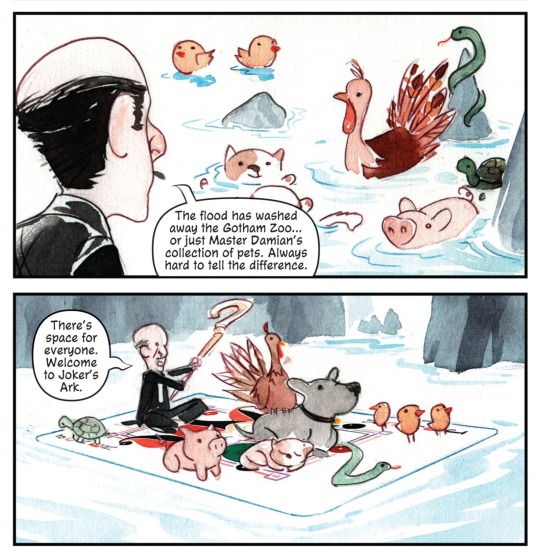
alfred in wonderland – batman tales: once upon a crime
[ID: a parody of the story Alice in Wonderland starring Alfred Pennyworth. In it, Alfred and Titus the Dog have been shrunk down and are using the Joker card as a raft. Alfred is sitting criss-crossed and is using a question mark cane as an oar. He comes across three baby chickens, a turkey, a green snake and turtle, a pink pig, and a cat floating on its back. Alfred jests to no one, “The flood has washed away the Gotham Zoo... or just Master Damian's collection of pets. Always hard to tell the difference.” Before addressing them to climb onboard, “There's space for everyone. Welcome to the Joker's Ark.” END ID]
#he loves his grandbaby....#c: batman tales: once upon a crime | alfred in wonderland#crypt's panels#alfred pennyworth#titus the dog
44 notes
·
View notes
Note
I know Vale had a lot of Spanish fans but after sepang 2015 did his following in Spain shrink likes Marc’s level of Italian fans probably dropped immensly but vale is like the king of the sport so I’m not sure if he would have lost as many Spanish fans as Marc did Italian ones. Also because he involved 2 Spanish riders would that impact the Spanish following and I’m not sure if the JL fans were fans of vale before sepang either.
Home to over a million people, Western North Carolina is a region in the United States culturally associated with the traditions of the Southern Appalachian Mountains. This region has a proud history that defies common stereotypes seen in films and television, which often prey on the generational poverty, lack of access to education, and distinctive accents that have characterized the region in the past. Contrary to these depictions, people from Southern Appalachia have cultivated a warm, unique folk tradition that has generated myriad works, including unique cultural practices concerning food, music, and craft. Bluegrass/country music is probably the most famous of these practices, and some of the most celebrated songwriters on the planet are from Southern Appalachia, including Dolly Parton (born ten miles from Great Smoky Mountain National Park), Loretta Lynn, and Tyler Childers. picture sources.
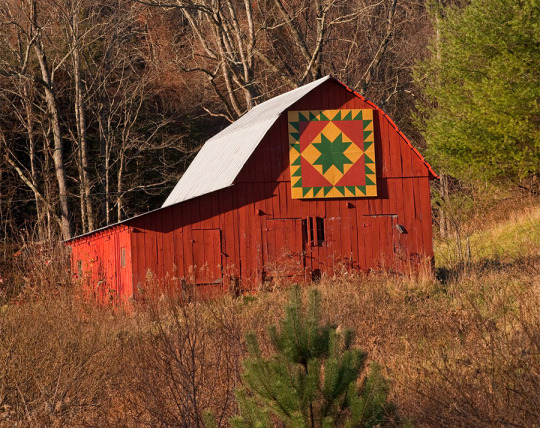

Of course, the first people to live in Southern Appalachia were the Cherokee People, who still live in the area today. A federally recognized tribe, the Eastern Band of the Cherokee People are the descendants of the few who where able to avoid systematic removal of their ancestors by the US Government via the Trail of Tears. At the beginning of the Twentieth Century, the remaining members of the tribe consolidated their collective land holdings in WNC to create an entirely Tribally-governed reservation, which has over the years introduced several tribal initiatives to revive and maintain the Cherokee people's unique culture, practices, language, food, art, and folk tales. It cannot be overstated the influence the Cherokee have had (and continue to have) on the culture of the region. art source.


It should also be noted that this is one of the most biodiverse places on the planet. Western North Carolina is home to Great Smoky Mountains National Park, as well as several National Forests that serve to protect a myriad of unique biomes and local wildlife. This area is one of two temperate rainforests in the United States, and experiences more rainfall in inches a year than Seattle. The name "Great Smoky Mountains" originates from the effect of the rainfall. Moisture hits the leaves of the abundant flora, and transpiration occurs, causing the plants to release evaporative clouds of mist, creating a "smoky" effect on the mountains. One of the most iconic wildflowers found in the area is trilium, which tends to bloom in the early spring in the shady patches of higher elevations. One of my personal favorites is called dutchman's pants! Which look like little lederhosen.
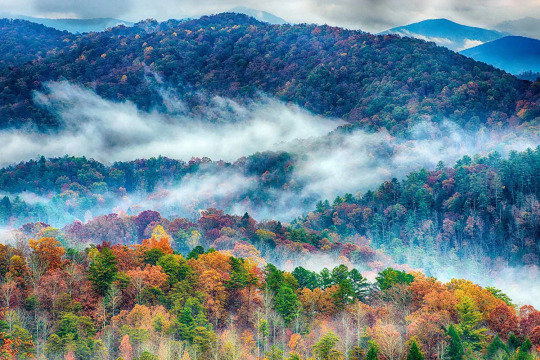


The area is home to many forms of wildlife, including deer, black bear, elk, river otter, possums, red wolves, turkey, and skunks. We are also known as the salamander capital of the world, and the National Park hosts over 30 unique species, including the hellbender! The largest type of salamander in the world.
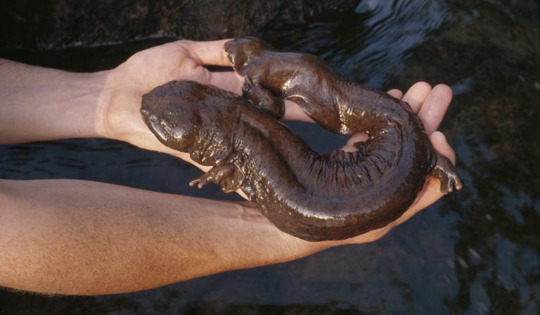
Popular activities and attractions in the area include hiking, biking, whitewater rafting/kayaking, driving the Blue Ridge Parkway, visiting the Biltmore House (in Asheville, NC), and, speaking from personal experience, just kind of hanging out in various grocery store parking lots with your friends. Its a wonderful and beautiful place to live and I love it lots. all of this to say. i do not know SHIT about spanish perception of vale post-sepang. i suspect he was mostly fine.




#im not spanish or italian... i dont know if you can tell from the everything about me but im a little appalachian girl. how would eye knoww#like nationality was a HUGE part of it and lines were drawn but im not the authority on this. and vale never got death threats so.#i can tell you about salamanders! SORRY SMOOCH.#callie speaks#asks#sorry someone made fun of my accent the other day when i showed him how to properly pronouce a cherokee word. and im PMSing.#so you WILL learn about appalachia.#'callie why is there a french style chateau in WNC' dont worry about it
13 notes
·
View notes
Text
Friday, August 2, 2024
US and Russia complete biggest prisoner swap in post-Soviet history (NYT) A prisoner swap involving seven countries freed the Wall Street Journal reporter Evan Gershkovich, two other Americans and several Russian opposition figures. It was the most far-reaching exchange between Russia and the West in decades. In return, Western governments released eight people, including Vadim Krasikov, who had been sentenced to life in prison in Germany for assassinating a Chechen former fighter in Berlin. The exchange took place today at the international airport in Ankara, Turkey’s capital, and it involved seven planes ferrying 24 prisoners who were from the U.S., Germany, Poland, Slovenia, Norway and Russia. The exchange was also a triumph of sorts for Russia’s president, Vladimir Putin, who had long sought Krasikov’s release. Russia legally permits people they accuse of extremism to be killed abroad, my colleague Neil MacFarquhar said. “So, in the eyes of the Kremlin, Krasikov’s assassination in Berlin of a Chechen separatist leader whom Russia labeled a terrorist was legitimate,” he said.
Governor calls on flood-weary Vermonters to ‘stick together’ with more thunderstorms on the horizon (AP) Vermont’s governor said Wednesday that the latest storms to hit the state have undone much of the cleanup and recovery work from its last major bout of flooding only weeks ago, and he called on residents to “stick together” amid fears that more bad weather could cause even more damage. Thunderstorms on Tuesday brought another round of heavy flooding that washed away roads, crushed vehicles, pushed homes off their foundations and required at least two dozen boat rescues in northeastern Vermont. Some areas got more than 8 inches (20 centimeters) of rain. More downpours arrived Wednesday, with flash flooding possible in some already inundated areas. “This time, it’s especially bad after workers spent the past three weeks working furiously to recover from the last flooding, “ Gov. Phil Scott said at the news conference. “It feels much worse than a punch or a kick. It’s simply demoralizing. But we can’t give up. We’ve got to stick together and fight back against the feeling of defeat.”
Maduro urges Venezuelans to report protesters who question his reelection (Washington Post) Government security forces are detaining volunteer poll watchers who monitored the presidential election here Sunday, opposition leaders said, and President Nicolás Maduro is encouraging Venezuelans to report protesters who dispute the claim that he won. More than 1,000 people have been arrested and at least 16 have been killed in mass protests since the election, government officials and civil society groups said Wednesday, as Venezuelans continued to question the reelection of the authoritarian socialist. Maduro’s electoral council says he defeated challenger Edmundo González by 7 percentage points to win six more years in office, but has refused to publish voting data to support the claim. Independent exit polling, an analysis of results from a sample of voting centers and, the opposition says, the government’s own records show González captured twice as many votes as Maduro. Maduro claimed on Wednesday that the opposition had hacked the country’s voting system.
Far-right rioters attack U.K. police, mosque amid false claims on stabbings (Washington Post) Police said the riot in Southport on Tuesday night was stoked in part by social media posts that incorrectly alleged that the stabbing was perpetrated by a recent asylum seeker who had arrived in Britain by illegally crossing the English Channel on a raft. Amid reported chants of ‘We want our country back,’ rioters pelted police with bricks, injuring as many as 50 officers and sending 27 to hospitals. The rioters also smashed the windows of a mosque, torched vehicles and looted a shop. The violence, on the same day the town was holding a peaceful, heartrending vigil for the dead and injured girls, stunned Britain, where the stabbings have been round-the-clock news.
Paris Triathletes Finally Swim in the Seine (Daily Beast) Olympic swimmers finally returned to the cleaned-up river Seine for the first time since 1900 for the men’s and women’s triathlons races—and the first reviews are in. “It didn’t taste great,” New Zealand racer Ainsley Thorpe told The Wall Street Journal. “It’s a little bit brown.” Torrential rains over the weekend had swept tons of wastewater and sewage into the river, overloading a $1.5 billion system to keep the waterway clean. Triathletes were then unable to familiarize themselves with the course, with training runs canceled for several days because of high bacteria levels, shown by daily testing for E. coli and enteroccus. The fact that organizers were able to run the triathlon, and not be forced to hold only a duathlon, will come as a relief to Paris Mayor Anne Hidalgo, who has made cleaning up the Seine a pet project and who took a much-publicized dip in the river two weeks ago with 100 city officials to show that the clean-up was working. The nightmare scenario—swimmers vomiting en masse after ingesting the polluted river water—was avoided, although one Canadian competitor, Tyler Mislawchuk, was captured by the TV cameras vomiting copiously after crossing the finish line.
In eastern Ukraine, Russian ‘glide bombs’ push civilians to flee (CSM) The tiny poodle strains at its leash and barks, triggering a deafening reaction from a pack of dogs roaming the wreckage in this town in Ukraine’s embattled far east, some 10 miles from Russia’s gradually advancing forces. “A lot of people are leaving, and let their dogs go,” explains the poodle’s owner, a retired Ukrainian military pilot who gives the name Oleksandr. On their right stands the shell of an apartment block, hollowed out just days before by a single Russian “glide bomb”—a heavy Soviet-era “dumb” bomb upgraded with wings and a guidance system, and launched from a plane deep inside Russian airspace. On their left is all that remains of a kindergarten complex. “A lot of people lived here all their lives, and have apartments and jobs, but now our lives look like this,” says Oleksandr, as he describes how Russia’s advancing forces and use of glide bombs are triggering new departures from this Donetsk coal mining town. “Now the front is coming closer, and it’s more and more dangerous to live here,” says Oleksandr. “Now the intensity of the strikes is like never before.” Augmenting Russia’s supply of rockets and missiles, the glide bombs, which can pack from 500 pounds to more than 3,000 pounds of explosive punch each, remain virtually unstoppable by Ukraine’s air defense systems.
As War Gets Bleaker, More Ukrainians Appear Open to a Peace Deal (NYT) Olha Predchenko held hands with her 85-year-old mother as they looked at the makeshift memorial on the grass in central Kyiv, each blue and yellow flag marked with the name of a soldier who had died fighting in the war with Russia. They come here often to Maidan Square, to spend time thinking about the dead and the war. Ms. Predchenko said she dreamed of something heavy falling on the Kremlin. But she also hoped for a peace deal soon. “Better a bad peace than a good war,” added Ms. Predchenko, 61. Increasingly frustrated, more Ukrainians appear to be opening up to the idea of a negotiated peace, even as they remain vague about what that means. Most Ukrainians still oppose ceding any territory to Russia, not even the Crimean peninsula that was seized by Russia 10 years ago, polls show. But those polls and recent remarks by the country’s leaders also highlight a palpable shift in the conversation around peace talks—from a no-deal-not-ever to a maybe-compromise-at-some-point.
China Wants to Start a National Internet ID System (NYT) It’s hard to be anonymous online in China. Websites and apps must verify users with their phone numbers, which are tied to personal identification numbers that all adults are assigned. Now it could get more difficult under a proposal by China’s internet regulators: The government wants to take over the job of verification from the companies and give people a single ID to use across the internet. The Ministry of Public Security and the Cyberspace Administration of China say the proposal is meant to protect privacy and prevent online fraud. Critics say it would further concentrate government control over the internet.
Hamas leader was killed by a bomb planted months ago (NYT) A Times investigation found that Ismail Haniyeh, a top leader of Hamas, was assassinated yesterday by an explosive device that was smuggled into the Tehran guesthouse where he was staying. The bomb was hidden approximately two months ago, but it was remotely triggered around 2 a.m. The guesthouse is run and protected by the Islamic Revolutionary Guards Corps, and Haniyeh had stayed there on several occasions while visiting Iran, Middle Eastern officials said. Israel has not publicly acknowledged responsibility for the killing, but Israeli intelligence officials briefed the U.S. and other Western governments on the operation in its aftermath.
Iran’s Leader Orders Attack on Israel for Haniyeh Killing, Officials Say (NYT) Iran’s supreme leader, Ayatollah Ali Khamenei, has issued an order for Iran to strike Israel directly, in retaliation for the killing in Tehran of Hamas’s leader, Ismail Haniyeh, according to three Iranian officials briefed on the order. Israel has a long history of killing enemies abroad, including Iranian nuclear scientists and military commanders. Through almost 10 months of war in Gaza, Iran has tried to strike a balance, putting pressure on Israel with sharply increased attacks by its allies and proxy forces in the region, while avoiding an all-out war between the two nations.
The cycle of violence and radicalization (NYT) Yesterday, Iran and Hamas accused Israel of killing Ismail Haniyeh, one of the most senior leaders of Hamas, while he was in Tehran. Diplomats around the world are telling these parties to keep a lid on it. And the groups themselves say they do not want a wider regional war. Israel’s defense minister repeated the message on Wednesday. Iran has said the same thing, and so has Hezbollah. Yet the violence persists, as each party claims its attacks are reactions to previous ones. That’s why, in the span of a few months, Israeli bombs have hit Lebanon, Syria, Iran and Yemen. It’s why Hezbollah and Houthi fighters have repeatedly targeted Israel (and also ships passing through the Red Sea, disrupting global trade). It’s why American airstrikes have pummeled Yemen for nearly seven months. After the Haniyeh strike, Qatari officials—who help moderate Gaza peace talks—threw up their hands. “How can mediation succeed when one party assassinates the negotiator on the other side?” the Qatari prime minister, Mohammed bin Abdulrahman Al Thani, wrote on social media. Israel suggests that it, too, feels locked in a cycle of violence. Prime Minister Benjamin Netanyahu said on Wednesday that Israel faced threats “from everywhere” and said that he refused to “surrender” to voices telling him simply to “end the war.” It’s sensible for diplomats around the world to insist on peace and restraint. Combatants do often put their grudges aside; that’s how wars end. But there’s another possible future, too. In that scenario, enmities between Israel and its neighbors are growing only deeper. Officials and scholars I’ve spoken to say they worry that an entire generation could be radicalized by the current war.
Nigerians are frustrated by economic hardship (AP) Frustrated with growing economic hardships, Nigerians are planning nationwide protests this week against the country’s worst cost-of-living crisis in a generation. And with momentum soaring on social media, authorities fear a replay of the deadly 2020 demonstrations against police brutality in this West African nation—or a wave of violence similar to last month’s protests in Kenya, where a tax hike led to chaos in the capital, Nairobi. The government of Nigerian President Bola Tinubu says it is determined to prevent such a scenario in a country that has long been a top African oil producer but whose citizens are among the world’s poorest. Nigerian politicians and lawmakers, often accused of corruption, are some of the best-paid in Africa. Even the president’s wife—her office nowhere in the constitution—is entitled to SUVs and other luxuries funded by taxpayers. Nigeria’s population of over 210 million people—the continent’s largest—is also among the hungriest in the world and its government has struggled to create jobs.
2 notes
·
View notes
Text
The Greek coastguard has caused the deaths of dozens of migrants in the Mediterranean over a three-year period, witnesses say, including nine who were deliberately thrown into the water.
The nine are among more than 40 people alleged to have died as a result of being forced out of Greek territorial waters, or taken back out to sea after reaching Greek islands, BBC analysis has found.
The Greek coastguard told our investigation it strongly rejects all accusations of illegal activities.
We showed footage of 12 people being loaded into a Greek coastguard boat, and then abandoned on a dinghy, to a former senior Greek coastguard officer. When he got up from his chair, and with his mic still on, he said it was "obviously illegal" and "an international crime".
The Greek government has long been accused of forced returns - pushing people back towards Turkey, where they have crossed from, which is illegal under international law.
But this is the first time the BBC has calculated the number of incidents which allege that fatalities occurred as a result of the Greek coastguard's actions.
The 15 incidents we analysed - dated May 2020-23 - resulted in 43 deaths. The initial sources were primarily local media, NGOs and the Turkish coastguard.
Verifying such accounts is extremely difficult - witnesses often disappear, or are too fearful to speak out. But in four of these cases we were able to corroborate accounts by speaking with eye witnesses.
Our research, which features in a new BBC documentary, Dead Calm: Killing in the Med?, suggested a clear pattern.
In five of the incidents, migrants said they were thrown directly into the sea by the Greek authorities. In four of those cases they explained how they had landed on Greek islands but were hunted down. In several other incidents, migrants said they had been put onto inflatable rafts without motors which then deflated, or appeared to have been punctured.
One of the most chilling accounts was given by a Cameroonian man, who says he was hunted by Greek authorities after landing on the island of Samos in September 2021.
Like all the people we interviewed, he said he was planning to register on Greek soil as an asylum seeker.
"We had barely docked, and the police came from behind," he told us. "There were two policemen dressed in black, and three others in civilian clothes. They were masked, you could only see their eyes."
He and two others - another from Cameroon and a man from Ivory Coast - were transferred to a Greek coastguard boat, he said, where events took a terrifying turn.
“They started with the [other] Cameroonian. They threw him in the water. The Ivorian man said: ‘Save me, I don’t want to die'… and then eventually only his hand was above water, and his body was below.
"Slowly his hand slipped under, and the water engulfed him."
Our interviewee says his abductors beat him.
"Punches were raining down on my head. It was like they were punching an animal." And then he says they pushed him, too, into the water - without a life jacket. He was able to swim to shore, but the bodies of the other two - Sidy Keita and Didier Martial Kouamou Nana - were recovered on the Turkish coastline.
The survivor’s lawyers are demanding the Greek authorities open a double murder case.
5 notes
·
View notes
Text
Tenipuri Complete Character Profile - Harukaze Kurobane

[PROFILE]

Birthday: September 9th (Libra)
Blood Type: A
Relatives: Father, mother, younger brother, dog (Jake), dog (Ricky)
Father’s Occupation: Company employee (manufacturer)
Elementary School: Rokkaku Fifth Elementary School
Middle School: Rokkaku Junior High School
Grade & Class: Third Year | Class 3-A | Seat 5
Club: Tennis Club (regular)
Committee: None
Strong Subjects: Math, PE
Weak Subjects: History
Most Visited Spot at School: The second ground
Favorite Motto: “Where there’s a will, there’s a way.”
Daily Routines: Walking (and running) his dogs

Hobbies: Beach activities (snorkeling [23.5])
Favorite Color: Red
Favorite Music: Hard rock
Favorite Movie: Major League
Favorite Book: Sports magazines
Favorite Food: Grilled corn, turkey legs [TP]
Preferred Type: A fun guy
Ideal Date Spot: A cave along the coast he recently discovered
His Gift for a Special Person: “It may sound ridiculous, but I’ll make anything happen.”
Where He Wants to Travel: The Grand Canyon
What He Wants Most Right Now: A giant, inflatable raft that everyone can ride
Dislikes: Detailed handiwork, neckties [TP]

Skills Outside of Tennis: Basketball dunk shots, beach seining [23.5]
Spends Allowance On: Dog food
Routine During the World Cup: Spending an hour in the sauna
[DATA]
Height: 184cm | 6’0” ➜ 185cm | 6’0.8” [23.5]
Weight: 73kg | 160 lbs ➜ 75kg | 165 lbs [23.5]
Shoe Size: 28.5cm
Dominant Arm: Right
Vision: 1.5 Left & Right
Play Style: Serve & Volleyer
Signature Moves: Aerial Combo, Pronation Serve
Average Time Spent Playing with the Future Rokkaku Members Each Day: 2 hours
Equipment Brands:
Racket: Gramps’ homemade wooden racket
Shoes: asics Challenger FX II (TLL618 0142)
Overall Rating: Speed: 3 / Power: 4 / Stamina: 3 / Mental: 3 / Technique: 3 / Total: 16
Kurobe Memo: “You can say he’s the rare, passionate type who can make use of his doubles partner. However, if both parties do not perform at full potential, it’ll only be a disadvantage in the future.” <Official Description>
3 notes
·
View notes
Text
The Greek government did not respond to repeated requests for comment. But campaigning on Lesbos last week ahead of general elections on Sunday, Prime Minister Kyriakos Mitsotakis defended his government’s “tough but fair” migration policies and boasted of a 90 percent drop in the arrival of “illegal migrants.”
The government has consistently denied mistreating asylum seekers and points to the fact that it shoulders a disproportionate burden of managing new arrivals to Europe.
But the video, provided by an Austrian aid worker, Fayad Mulla, who has spent much of the past two and a half years working on the island and trying to document abuses against migrants, may be the most damning evidence yet of the Greek authorities’ violation of international laws and E.U. rules governing how asylum seekers must be treated...
It was just after midday on April 11 that a white unmarked van drove down to a small cove with a wooden dock at the southern tip of Lesbos, according to Mr. Mulla’s video.
As the van wound down to the coastline, two men waiting in a speedboat covered their faces with what appear to be ski masks. When the van stopped, three men emerged, unlocked the back doors — and out filed 12 people, several of them small children.
The passengers included Ms. Aden and her baby, Awale, with whom she had originally fled Jilib, a small city in an area of Somalia controlled by Al Shabab, a militant group linked with Al Qaeda, she said. Ms. Aden said they had landed on Lesbos in a smugglers’ dinghy a day earlier and had spent a night hiding in the brush before being rounded up by masked men.
Sulekha Abdullahi, 40, and her six children were crammed in the van, too.
So were Mahdi, 25, and Miliyen, 33, who said they had also arrived on Lesbos by dinghy and sought cover in the brush. They were captured after a short pursuit, and Miliyen’s ankles still bore deep scratches when we interviewed him days later.
They agreed to share their stories but asked to be identified only by their first names, fearful of retribution.
A few minutes after the group was escorted out of the van, everyone was taken out on the Aegean waters in the speedboat. From a distance it looked like a tourist leisure ride. It was anything but.
Another three minutes passed and then the speedboat approached Coast Guard vessel 617, which was mostly paid for with E.U. funds, according to archived lists of Greek Coast Guard assets.
One by one, the migrants were unloaded from the speedboat and taken to the stern of the Coast Guard boat, escorted by six unmasked individuals, some of whom appeared to be wearing the standard dark blue uniform.
The Coast Guard craft then turned eastward toward Turkey and got underway. The boat was not sending out its location, according to Marine Traffic, a maritime live data platform that tracks vessels. But The Times was able to approximate its position using location data from other nearby commercial vessels visible in the footage.
The Coast Guard boat stopped when it neared the edge of Greece’s territorial waters. The video Mr. Mulla shot from the Lesbos coast is blurry because of the distance, but a black object can later be seen floating beside the Coast Guard boat.
In interviews at the Izmir detention facility, all the migrants recounted being pushed onto a black inflatable life raft and set adrift. The use of these engineless rafts has been documented in the past, but the Greek authorities have denied leaving migrants afloat in them, because they are unnavigable and can overturn.
The Greek authorities often use a fax message to tip off their counterparts to the presence of stranded migrants in Turkish territorial waters, according to Turkish officials, and an hour or so after the migrants were abandoned, two Turkish Coast Guard boats appeared...
The Turkish authorities may rescue the migrants at sea, but they accord them only limited rights.
On paper, Ms. Oguz said, the asylum seekers have a right to apply for international protection in Turkey — but the chances are slim. “They do apply, but they’re rejected,” she said. The Turkish authorities did not respond to requests for comment.
By contrast, more than 80 percent of Eritreans and more than half of the Somalis who applied for protection in the European Union last year were successful, according to official statistics.
“I just wanted to go to a place where I can seek safety,” Ms. Aden said.
7 notes
·
View notes
Note
Amber, bronze, bumblebee, lemon
Colorful Interview :: Accepting
[ amber ] which is your favorite season? why?
Fall. I love fall. It's the perfect weather. Not too hot, not too cold. The leaves on the trees are changing colors. I love the way fall smells, the way it feels.. It's the best season.
Plus. Hello. Halloween.
[ bronze ] if you were stranded on a deserted island, which three things would you want to have with you?
My kindle. My mothman plushie. My laptop with a hotspot. I realize I'd probably have no way to charge two of these things and I should be smarter.. But I suppose I can't like.. Pick a raft as one of my three.
[ lemon ] do you believe in ghosts? how about aliens?
Yes, I have many a ghost story to tell. Yes. I have two stories about UFOs actually.
[ bumblebee ] where have you always wanted to travel to?
Turkey! My god. I can't wait. We were supposed to go this year but life sucks and ruined our plans. But soon. Soon we will be going to that most amazing country.
#::: { asks } so does this mean ann margret's not coming?#thesilverandjetsystem#::: { ooc } ours is not to question why; ours is but to do or die
2 notes
·
View notes
Text
Events 7.2
437 – Emperor Valentinian III begins his reign over the Western Roman Empire. His mother Galla Placidia ends her regency, but continues to exercise political influence at the court in Rome. 626 – Li Shimin, the future Emperor Taizong of Tang, ambushes and kills his rival brothers Li Yuanji and Li Jiancheng in the Xuanwu Gate Incident. 706 – In China, Emperor Zhongzong of Tang inters the bodies of relatives in the Qianling Mausoleum, located on Mount Liang outside Chang'an. 866 – Battle of Brissarthe: The Franks led by Robert the Strong are defeated by a joint Breton-Viking army. 936 – King Henry the Fowler dies in his royal palace in Memleben. He is succeeded by his son Otto I, who becomes the ruler of East Francia. 963 – The Byzantine army proclaims Nikephoros II Phokas Emperor of the Romans on the plains outside Cappadocian Caesarea. 1298 – The Battle of Göllheim is fought between Albert I of Habsburg and Adolf of Nassau-Weilburg. 1494 – The Treaty of Tordesillas is ratified by Spain. 1504 – Bogdan III the One-Eyed becomes Voivode of Moldavia. 1555 – Ottoman Admiral Turgut Reis sacks the Italian city of Paola. 1561 – Menas, emperor of Ethiopia, defeats a revolt in Emfraz. 1582 – Battle of Yamazaki: Toyotomi Hideyoshi defeats Akechi Mitsuhide. 1613 – The first English expedition (from Virginia) against Acadia led by Samuel Argall takes place. 1644 – English Civil War: Battle of Marston Moor. 1645 – Battle of Alford: Wars of the Three Kingdoms. 1698 – Thomas Savery patents the first steam engine. 1723 – Bach's Magnificat is first performed. 1776 – American Revolution: The Continental Congress adopts a resolution severing ties with the Kingdom of Great Britain although the wording of the formal Declaration of Independence is not adopted until July 4. 1816 – The French frigate Méduse strikes the Bank of Arguin and 151 people on board have to be evacuated on an improvised raft, a case immortalised by Géricault's painting The Raft of the Medusa. 1822 – Thirty-five slaves, including Denmark Vesey, are hanged in South Carolina after being accused of organizing a slave rebellion. 1823 – Bahia Independence Day: The end of Portuguese rule in Brazil, with the final defeat of the Portuguese crown loyalists in the province of Bahia. 1839 – Twenty miles off the coast of Cuba, 53 kidnapped Africans led by Joseph Cinqué mutiny and take over the slave ship Amistad. 1840 – A Ms 7.4 earthquake strikes present-day Turkey and Armenia; combined with the effects of an eruption on Mount Ararat, kills 10,000 people. 1853 – The Russian Army crosses the Prut river into the Danubian Principalities (Moldavia and Wallachia), providing the spark that will set off the Crimean War. 1864 – Dimitri Atanasescu founds the first Romanian school in the Balkans for the Aromanians in Trnovo, in the Ottoman Empire (now in North Macedonia). 1871 – Victor Emmanuel II of Italy enters Rome after having conquered it from the Papal States. 1881 – Charles J. Guiteau shoots and fatally wounds U.S. President James A. Garfield (who will die of complications from his wounds on September 19). 1890 – The U.S. Congress passes the Sherman Antitrust Act. 1897 – British-Italian engineer Guglielmo Marconi obtains a patent for radio in London. 1900 – An airship designed and constructed by Count Ferdinand von Zeppelin of Germany made its first flight on Lake Constance near Friedrichshafen. 1900 – Jean Sibelius' Finlandia receives its première performance in Helsinki with the Helsinki Philharmonic Society conducted by Robert Kajanus. 1921 – World War I: U.S. President Warren G. Harding signs the Knox–Porter Resolution formally ending the war between the United States and Germany. 1934 – The Night of the Long Knives ends with the death of Ernst Röhm. 1937 – Amelia Earhart and navigator Fred Noonan are last heard from over the Pacific Ocean while attempting to make the first equatorial round-the-world flight. 1940 – Indian independence leader Subhas Chandra Bose is arrested and detained in Calcutta. 1940 – The SS Arandora Star is sunk by U-47 in the North Atlantic with the loss of over 800 lives, mostly civilians. 1962 – The first Walmart store, then known as Wal-Mart, opens for business in Rogers, Arkansas. 1964 – Civil rights movement: U.S. President Lyndon B. Johnson signs the Civil Rights Act of 1964 meant to prohibit segregation in public places. 1966 – France conducts its first nuclear weapon test in the Pacific, on Moruroa Atoll. 1976 – End of South Vietnam; Communist North Vietnam annexes the former South Vietnam to form the unified Socialist Republic of Vietnam. 1986 – Rodrigo Rojas and Carmen Gloria Quintana are burnt alive during a street demonstration against the dictatorship of General Augusto Pinochet in Chile. 1986 – Aeroflot Flight 2306 crashes while attempting an emergency landing at Syktyvkar Airport in Syktyvkar, in present-day Komi Republic, Russia, killing 54 people. 1988 – Marcel Lefebvre and the four bishops he consecrated were excommunicated by the Holy See. 1990 – In the 1990 Mecca tunnel tragedy, 1,400 Muslim pilgrims are suffocated to death and trampled upon in a pedestrian tunnel leading to the holy city of Mecca. 1994 – USAir Flight 1016 crashes near Charlotte Douglas International Airport, killing 37 of the 57 people on board. 1997 – The Bank of Thailand floats the baht, triggering the Asian financial crisis. 2000 – Vicente Fox Quesada is elected the first President of México from an opposition party, the Partido Acción Nacional, after more than 70 years of continuous rule by the Partido Revolucionario Institucional. 2001 – The AbioCor self-contained artificial heart is first implanted. 2002 – Steve Fossett becomes the first person to fly solo around the world nonstop in a balloon. 2005 – The Live 8 benefit concerts takes place in the G8 states and in South Africa. More than 1,000 musicians perform and are broadcast on 182 television networks and 2,000 radio networks. 2008 – Colombian conflict: Íngrid Betancourt, a member of the Chamber of Representatives of Colombia, is released from captivity after being held for six and a half years by FARC. 2010 – The South Kivu tank truck explosion in the Democratic Republic of the Congo kills at least 230 people. 2013 – The International Astronomical Union names Pluto's fourth and fifth moons, Kerberos and Styx. 2013 – A magnitude 6.1 earthquake strikes Aceh, Indonesia, killing at least 42 people and injuring 420 others.
1 note
·
View note
Text
Top 8 Water Activities in Turkey for the best Adventure
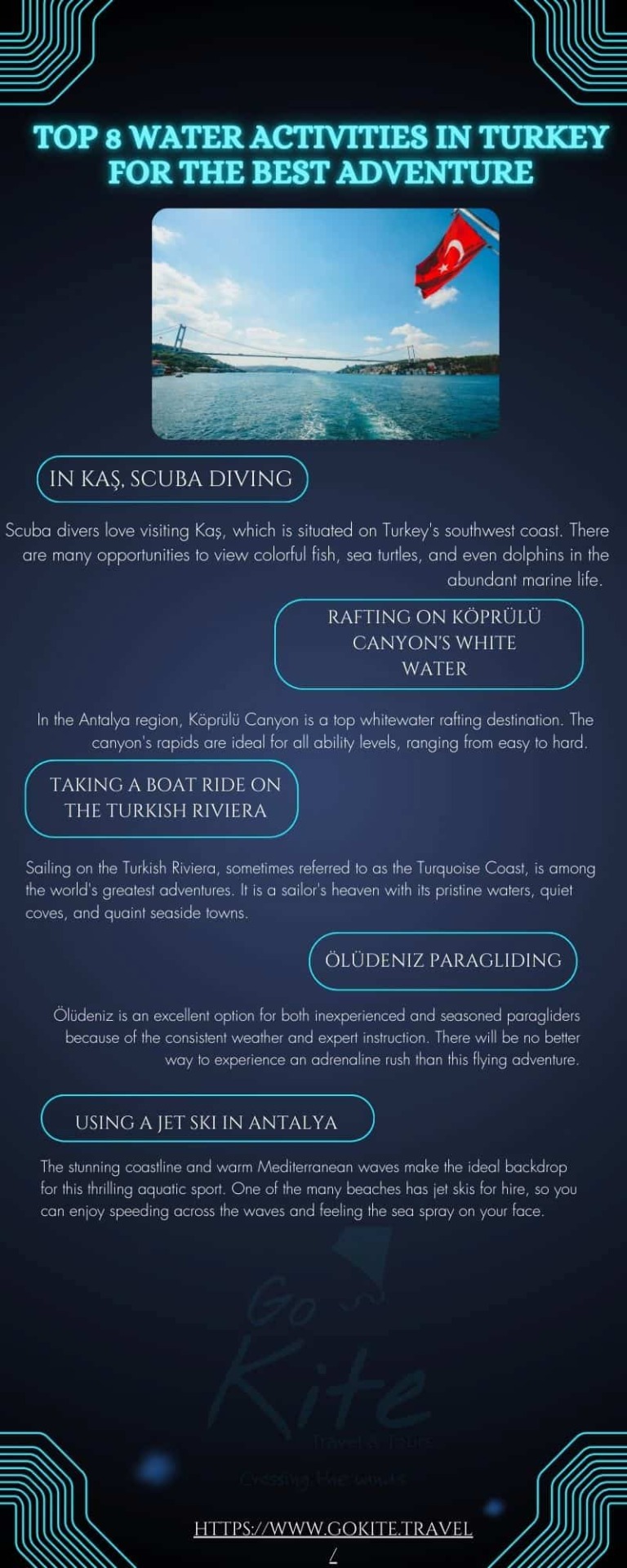
Turkey is a country filled with diverse landscapes and rich history, but it also offers a wide array of exciting water activities for adventure seekers. From the clear blue waters of the Mediterranean and Aegean Seas to the rushing rivers and serene lakes, Turkey provides the perfect backdrop for an unforgettable aquatic adventure. Whether you are looking to dive into the depths of the sea, soar above stunning beaches, or paddle through calm rivers, there is something for everyone. Popular destinations like Kaş, Antalya, and Bodrum are renowned for their beautiful coastlines and vibrant marine life, making them ideal for activities like scuba diving, jet skiing, and snorkeling. The stunning landscapes of places like the Turkish Riviera and Ölüdeniz offer fantastic opportunities for sailing and paragliding. For those who love river adventures, Köprülü Canyon provides thrilling whitewater rafting experiences. Additionally, spots like Alaçatı are perfect for windsurfing, thanks to their consistent winds and shallow waters. No matter what kind of water activity you prefer, Turkey's natural beauty and varied environments ensure that your adventure will be both exciting and memorable. Dive in and explore the top water activities in Turkey for an unparalleled adventure experience.
Here are some water activities in Turkey for the best adventure.
1. In Kaş, Scuba Diving: Scuba divers love visiting Kaş, which is situated on Turkey's southwest coast. Divers may explore vivid coral reefs, underwater caverns, and historic shipwrecks in the Mediterranean Sea's clean waters because of the exceptional visibility they provide. There are many opportunities to view colorful fish, sea turtles, and even dolphins in the abundant marine life. Popular dive spots include the Canyon and the Blue Hole. Kaş offers an unforgettable underwater experience for both novice and expert divers.
2. Rafting on Köprülü Canyon's white water: In the Antalya region, Köprülü Canyon is a top whitewater rafting destination. The canyon's rapids are ideal for all ability levels, ranging from easy to hard. You'll be encircled by breathtaking landscapes as you travel the Köprüçay River, featuring towering cliffs, dense forests, and historic Roman bridges. Whitewater rafting in Köprülü is an amazing experience because of the beauty of the canyon and the rush of successfully navigating the rapids.
3. Taking a boat ride on the Turkish Riviera: Sailing on the Turkish Riviera, sometimes referred to as the Turquoise Coast, is among the world's greatest adventures. It is a sailor's heaven with its pristine waters, quiet coves, and quaint seaside towns. Popular places to start are Fethiye, Marmaris, and Bodrum. You can see historic monuments, swim in crystal-clear waters, and discover secret coves by hiring a yacht or going on a gulet cruise. Sail along the Turkish Riviera to experience adventure, leisure, and stunning beauty.
4. Ölüdeniz paragliding: Renowned for its breathtaking Blue Lagoon, Ölüdeniz is among the world's top destinations for paragliding. Paragliders can thrill to the thrill of flight and take in expansive views of the blue sea, verdant forests, and sandy beaches below as they take off from the summit of Babadağ Mountain. Ölüdeniz is an excellent option for both inexperienced and seasoned paragliders because of the consistent weather and expert instruction. There will be no better way to experience an adrenaline rush than this flying adventure.
5. Using a jet ski in Antalya: On the southern coast of Turkey, Antalya is a well-liked jet skiing location. The stunning coastline and warm Mediterranean waves make the ideal backdrop for this thrilling aquatic sport. One of the many beaches has jet skis for hire, so you can enjoy speeding across the waves and feeling the sea spray on your face. Jet skiing is a must-do adventure in Antalya, whether you're seeking a short thrill or a lengthy journey to explore the coastline.
6. Alaçatı Wind Surfing: Alaçatı, located on Turkey's Aegean coast, is well-known for its reliable winds and ideal windsurfing conditions. It's the perfect place for novices and experienced windsurfers alike because of the calm, shallow waters and consistent wind. Numerous windsurfing schools are available that provide instruction and equipment rentals. Alaçatı is an excellent site to experience Turkish hospitality and culture, in addition to being a terrific place for windsurfing. The town itself is attractive, with small alleys, stone houses, and lively cafes.
7. Dalyan River Canoeing: With its serene waters and breathtaking scenery, the Dalyan River is the ideal place for a leisurely canoe excursion. As you paddle down the river, you'll see a variety of fauna, beautiful vegetation, and old rock tombs carved into cliffs. Reaching İztuzu Beach, a loggerhead sea turtle nesting place that is protected, is one of the highlights of a canoeing journey in Dalyan. Canoeing in Dalyan is a special and entertaining water sport that provides a tranquil opportunity to see the natural world and local history.
8. Bodrum snorkeling: Bodrum, well-known for its exciting nightlife and historical landmarks, is a great place to go snorkeling. Underwater rock formations and vibrant marine life can be seen in the crystal-clear Aegean waters surrounding Bodrum. Popular locations for snorkeling are Karaada Island, which is renowned for its warm springs and crystal-clear seas, and Aquarium Bay, where you may swim with a variety of species. All ages can enjoy the accessible sport of snorkeling in Bodrum, which offers a view of the Turkish coast's underwater splendor.
Conclusion
In conclusion, Turkey offers a wide range of thrilling water activities that cater to every adventurer's taste. From diving into the vibrant underwater world of Kaş to sailing along the stunning Turkish Riviera, there is no shortage of excitement and beauty to be found in Turkey's waters. Whether you’re jet skiing in Antalya, paragliding over Ölüdeniz, or windsurfing in Alaçatı, each activity provides a unique way to experience Turkey’s diverse landscapes and rich culture. Obtaining a Turkey visa is a straightforward process, and travelers from all over the world, including those applying for a Turkey visa from UAE Turkey visa from Dubai or a Turkey visa from Abu Dhabi, can easily plan their trips to explore these aquatic adventures. With its mix of tranquil rivers, bustling coastal cities, and serene beaches, Turkey is an ideal destination for anyone looking to combine adventure with natural beauty. So, if you're planning your next holiday, consider the incredible water activities Turkey has to offer. Get your Turkey visa, pack your bags, and prepare for an unforgettable adventure in one of the world’s most beautiful and dynamic countries. Whether you're coming from Dubai, Abu Dhabi, or anywhere else, Turkey promises a thrilling and memorable experience.
0 notes
Text
Adventure Travel in Turkey: Hiking, Paragliding, and More
Turkey, a country straddling two continents, offers a diverse landscape that caters to adventure enthusiasts of all kinds. Whether you're exploring the captivating places to visit in Bodrum, Turkey, or diving into exhilarating adventure activities in Istanbul, Turkey From soaring mountains and deep valleys to pristine coastlines and historical ruins, Turkey provides endless opportunities for thrill-seekers. The country’s varied topography ensures that every adventurer finds their perfect escape. This guide explores some of the best adventure activities Turkey has to offer, focusing on hiking, paragliding, and other adrenaline-pumping experiences.
1. Lycian Way

The Lycian Way is perhaps Turkey's most famous hiking trail, stretching over 540 kilometers along the southwestern coast. This trail takes you through ancient ruins, lush forests, and quaint coastal villages. The views of the turquoise Mediterranean Sea from the cliffs are breathtaking. Key highlights include the ruins of Patara, the ghost village of Kayaköy, and the stunning Butterfly Valley.
2. Cappadocia's Fairy Chimneys
Cappadocia offers a surreal hiking experience with its unique rock formations known as fairy chimneys. The region's trails, such as the Rose Valley and Pigeon Valley, lead you through a landscape dotted with ancient cave dwellings and churches carved into the rocks. The Goreme National Park, a UNESCO World Heritage site, is a must-visit for its spectacular scenery.
3. Mount Ararat

For those seeking a more challenging hike, Mount Ararat, Turkey's highest peak at 5,137 meters, offers an exhilarating adventure. This dormant volcano is steeped in legend and is believed to be the resting place of Noah's Ark. The climb requires a good level of fitness and proper acclimatization, but the reward is an unforgettable view from the summit.
4. Pamukkale
Pamukkale, known for its thermal springs and white travertine terraces, also offers a unique paragliding experience. Soaring above this natural wonder, you'll have a bird's-eye view of the stunning white terraces and the ancient city of Hierapolis. The contrast between the blue pools and white terraces is a sight to behold.
5. Scuba Diving in Kaş
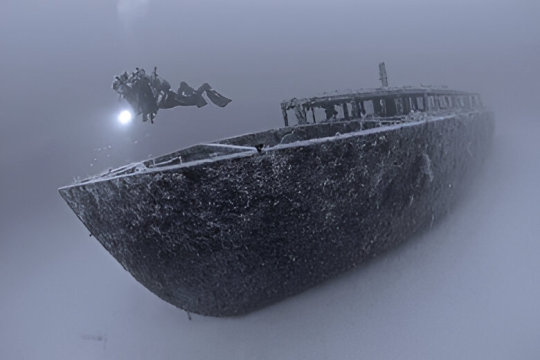
The coastal town of Kaş is a paradise for scuba diving enthusiasts. The clear waters of the Mediterranean Sea offer excellent visibility, and the underwater landscape is teeming with marine life. Divers can explore sunken ships, ancient amphoras, and even an underwater sculpture park. The Blue Hole, an underwater cave, is a popular spot for advanced divers.
6. White-Water Rafting on the Çoruh River
The Çoruh River, located in northeastern Turkey, is one of the fastest-flowing rivers in the world, making it a prime location for white-water rafting. The river offers various levels of rapids, suitable for both beginners and experienced rafters. The scenic beauty of the surrounding Kaçkar Mountains adds to the thrill of the ride.
Conclusion
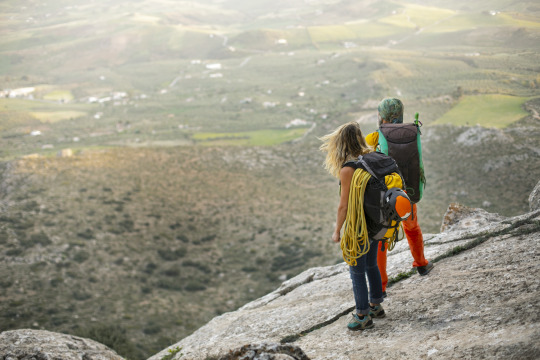
Turkey's diverse landscapes and favorable climate make it an ideal destination for adventure travel. Whether you're hiking ancient trails, soaring above stunning coastlines, or diving into the depths of the Mediterranean, Turkey offers a wealth of experiences that cater to every adventure seeker's dream. So pack your gear and get ready to explore the thrilling side of this fascinating country.
0 notes
Text
Cast: Maria Callas, Massimo Girotti, Lauren Terzieff, Giuseppe Gentile, Margareth Clémenti, Paul Jabara. Screenplay: Pier Paolo Pasolini, based on a play by Euripedes. Cinematography: Ennio Guarnieri. Production design: Dante Ferretti. Costume design: Piero Tosi. Film editing: Nino Baragli.
Pier Paolo Pasolini's retelling of the story of Medea is a challenge to anyone who doesn't already know the story: Pasolini is not interested in conventional movie storytelling, so the film feels shapeless, lurching through some scenes and lingering through others until it ends almost abruptly. What he's interested in is crafting a vision of antiquity, of the age from which the myths and legends came, that's primitive and tribal, not at all the graceful world of marble gods and goddesses we've come to associate with ancient Greece. This is a world in which people scrabble for survival in bleak desert settings, filmed in Turkey and Syria. In Pasolini's film, the Argo, the ship that brings Jason and the Argonauts to Colchis in search of the Golden Fleece, is a cobbled-together raft. The fleece itself is a somewhat ratty-looking ram's head with gilded horns. It's not exactly a film in which you'd expect to find a diva like Maria Callas, and yet her out-of-placeness somehow fits the character of Medea, a woman who would rise above almost any setting only to be dragged down by it.
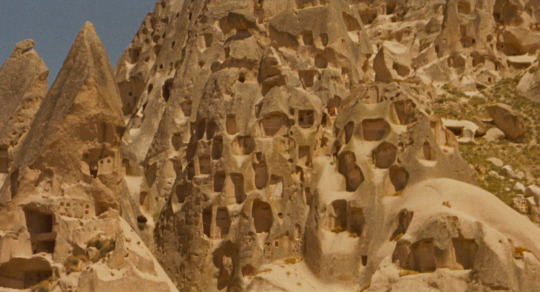
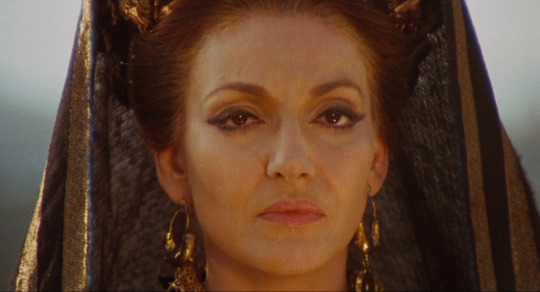
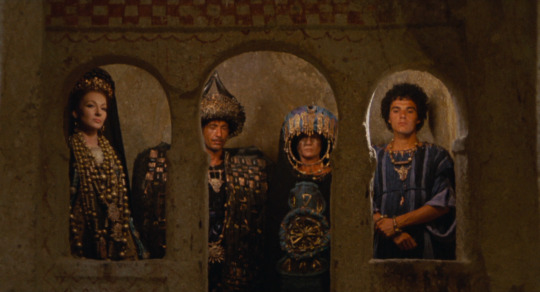
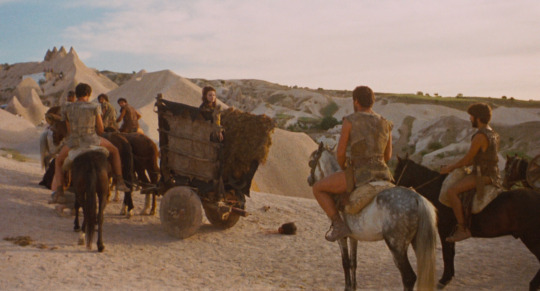



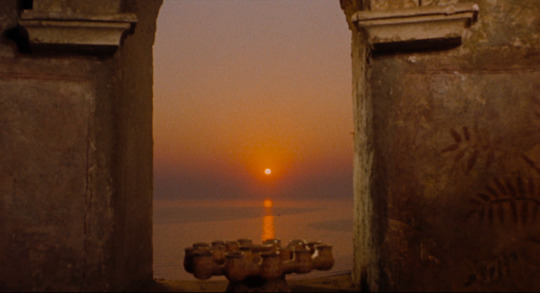
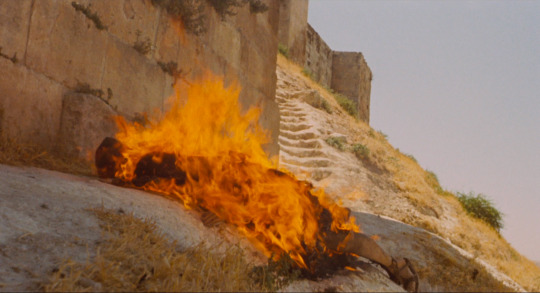

Medea (1969) Dir. Pier Paolo Pasolini
826 notes
·
View notes